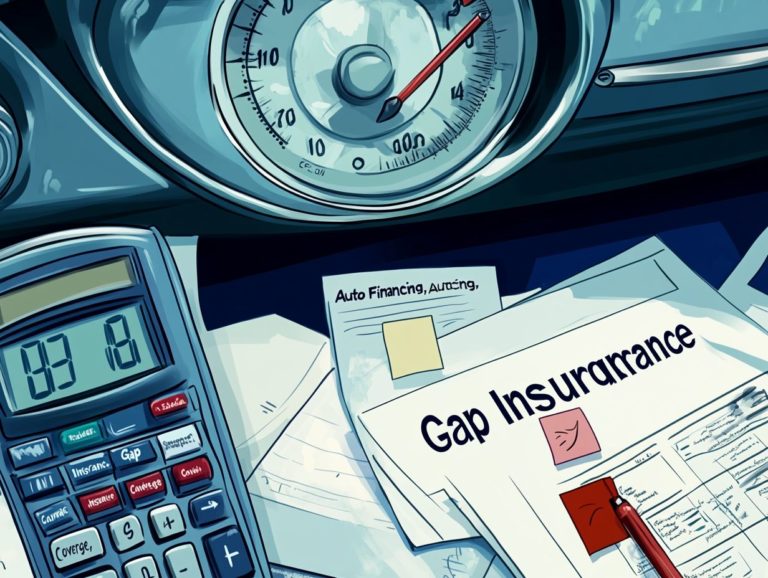The Risks of Long-Term Car Loans
Long-term car loans may catch your eye with their attractive lower monthly payments and the enticing prospect of driving the car you’ve always dreamed of. However, you must be aware of the big risks involved! These loans can significantly impact your financial well-being, leading to higher total costs, inflated interest rates, and the unsettling possibility of negative equity, which means you owe more on your car loan than your car is worth. Grasping these pitfalls is vital before you make any commitments.
This article delves into the intricacies of long-term car loans, examines viable alternatives, and offers practical tips to help you navigate this often-overlooked facet of car financing.
Contents
Key Takeaways:

Long-term car loans can be risky due to their higher total cost, inflated interest rates, and potential negative equity. Consider alternatives such as shorter loan terms or leasing options to avoid these risks. Do your research, negotiate, and have a budget and financial plan in place to avoid falling into the traps of long-term car loans.
Understanding Long-Term Car Loans
Understanding long-term car loans requires a keen grasp of their structure, advantages, and possible drawbacks within the realm of vehicle financing. These loans generally extend over several years, allowing you to buy a car without the immediate strain of upfront expenses.
With a range of interest rates and monthly payments, long-term loans can significantly impact your financial landscape and credit profile. You may need to make a down payment, which can influence both the total cost of the loan and your monthly obligations.
Furthermore, it s essential to comprehend how the vehicle’s value and depreciation rate play a role in long-term loans, equipping you for well-informed decision-making.
Definition and Common Terms
Long-term auto loans offer a financing solution that typically spans three to seven years, allowing you to manage your monthly payments with ease while buying a car. These loans are designed to spread the total cost of the vehicle over an extended period, resulting in lower monthly payments that can significantly alleviate immediate financial strain.
The loan term is essential, as it influences both the total interest paid and the car’s value depreciation over time. A reasonable down payment can further reduce your monthly obligations and create equity in the vehicle, enhancing your overall financial standing.
Establishing a strong credit score is crucial since it directly impacts the interest rates available to you and ultimately affects the overall affordability of your long-term auto loan.
The Risks of Long-Term Car Loans
While long-term car loans may offer the appeal of lower monthly payments, recognizing the array of risks that can affect your financial landscape over time is essential. One significant concern is negative equity, where the car’s value depreciates faster than you repay the loan, potentially resulting in a situation where your auto loan debt surpasses the vehicle’s worth.
Extended loan terms can lead to higher overall costs due to accumulated interest, particularly in an environment of inflated interest rates. Therefore, you must carefully evaluate your long-term financial goals and consider effective risk management strategies before committing to a long-term loan.
Higher Total Cost
One of the notable downsides of long-term auto loans is that they often lead to a higher total cost over time, primarily because of extended interest payments. When you choose longer loan terms, you may find yourself paying significantly more in interest compared to loans with shorter durations.
This extended timeline impacts not just the total cost of your vehicle; it can also inflate your monthly payments, potentially straining your budget. To ease these financial burdens, consider strategies such as auto loan refinancing to take advantage of lower interest rates or to shorten the term.
By carefully evaluating your personal financial situation, you can optimize your loan terms, striking a balance between manageable monthly payments and the overall cost of financing your vehicle.
Before making any decisions, consider consulting a financial advisor or doing further research to ensure you understand your options fully.
Inflated Interest Rates

Inflated interest rates pose a significant risk with long-term car loans, potentially amplifying the overall money stress associated with the loan. When lenders assess the risks involved in offering financing, they consider various factors that may lead to elevated interest rates.
A thorough examination of your credit score, alongside the current economic landscape and market conditions, can create a scenario where the cost of borrowing feels overwhelming. If your credit score is on the lower end, you might encounter even higher rates, which can strain your ability to manage monthly payments.
To reduce these risks, focus on enhancing your credit score through:
- Timely bill payments
- Reducing existing debts
- Saving for a larger down payment
By implementing these strategies, you can strengthen your financial profile and improve your chances of securing more favorable loan terms.
Potential Negative Equity
The risk of negative equity is a serious concern in long-term car loans. You face negative equity when you owe more than your car is worth, especially since vehicles tend to depreciate quickly, often outpacing your loan repayment schedule.
Various factors contribute to this, including a high initial purchase price, extended financing terms, and lower-than-expected resale values. As your car loses value, you might find yourself ensnared in a cycle of debt, owing more than you could recover from selling your vehicle.
To navigate this tricky terrain, consider the following strategies:
- Opt for shorter loan terms
- Make larger down payments
- Stay informed about the depreciation rates specific to the models you re interested in
By implementing these approaches, you can mitigate your risk of negative equity and make more informed financial choices.
Alternativas a los pr stamos para autom viles a largo plazo
Exploring alternatives to long-term car loans can transform your financial future! This opens up a world of financially sustainable options tailored to your unique circumstances and financial aspirations.
By considering these alternatives, you can align your decisions with your economic well-being and future goals. Start exploring your options today!
Shorter Loan Terms
Opting for shorter loan terms often means you’ll encounter higher monthly payments. However, this strategy can greatly reduce the total interest paid over time.
You may find yourself scrutinizing your monthly budget more closely, as those increased payments could strain your finances in the short term. However, the silver lining is the potential savings on interest, which can translate to lower overall costs by the time you pay off the loan.
If you re considering refinancing an auto loan, weigh the advantages of a shorter term against what you can manage in monthly payments. Take the time to explore options that might offer improved interest rates or more favorable terms this can have a significant positive impact on your financial situation.
Leasing Options
Leasing options present an enticing alternative to outright vehicle purchases through long-term loans. Leasing lets you drive the newest cars with the latest features, providing you with lower monthly payments and greater flexibility.
Leasing grants you access to cutting-edge technology and safety enhancements. However, it’s crucial to weigh some potential drawbacks, such as repair costs that may not be covered under warranty and the fact that once the lease term concludes, you won t own the vehicle.
Current trends in the vehicle market, including fluctuating interest rates and rising prices, play a significant role in your leasing decisions. This landscape encourages you to thoughtfully assess the pros and cons before making a commitment.
How to Avoid the Risks of Long-Term Car Loans

To successfully navigate the potential pitfalls of long-term car loans, engage in comprehensive research and implement effective financial planning strategies.
This careful approach will empower you to make informed decisions and safeguard your financial well-being. Don t wait! Understanding loan terms can save you thousands!
Take charge of your financial future today!
Research and Negotiation Strategies
Conducting thorough research and employing effective negotiation strategies give the power to you to secure better terms on your auto loans.
By delving deeper into crucial areas, such as understanding lender risk, you can assess which institutions are more likely to extend favorable loan offers. It’s also vital to analyze your credit profile, as a stronger credit score can unlock lower interest rates.
It s wise to gather information on various lenders, compare their offers, and come prepared to negotiate. Consider showcasing your strong credit history to make a compelling case! You should also explore co-signer options to enhance the entire financing experience.
Each step you take can lead to significant savings and more advantageous loan conditions.
Budgeting and Financial Planning
Effective budgeting and financial planning are essential for managing monthly payments on long-term car loans. These practices also help secure your financial future.
By taking a moment to assess your current financial situation, you can gain valuable insight into your income, expenses, and savings goals. This reflection helps you identify any potential strains that high auto loan payments might impose, allowing you to craft a realistic budget that aligns with your lifestyle.
By prioritizing essential expenses, setting aside funds for emergencies, and setting aside a specific amount for your monthly loan payments, you can significantly reduce the risk of slipping into excessive debt.
Employing techniques such as the envelope method, which allocates cash for different spending categories into separate envelopes, or using budgeting apps facilitates sustainable financial management. This ensures that your debt levels remain manageable while paving the way for a secure financial future.
Don’t wait; start budgeting today to avoid future financial stress!
Frequently Asked Questions
What are the risks of taking out a long-term car loan?
The risks of long-term car loans include paying more in interest over time, being upside down on your loan, and potentially being stuck with a car that no longer meets your needs.
Does the length of the loan affect its interest rate?

Yes, typically the longer the loan term, the higher the interest rate will be. This is because the lender is taking on more risk by loaning money for a longer period of time.
How does a long-term car loan affect my finances?
A long-term car loan can have a significant impact on your finances, as it often means paying higher interest and stretching out your monthly payments for a longer period of time. This can make it difficult to save money and can also affect your credit score.
What is considered a long-term car loan?
A long-term car loan is typically any loan with a duration of 72 months or longer. This can vary depending on the lender, but in general, any loan longer than 6 years is considered a long-term car loan.
Can I refinance a long-term car loan?
Yes, you may be able to refinance your long-term car loan. However, it is important to carefully consider the potential costs and benefits before refinancing, as it may not always be the best option.
Are there any alternatives to taking out a long-term car loan?
Yes, there are alternatives to taking out a long-term car loan such as leasing a car, buying a used car, or even saving up and paying for a car in cash. It is important to research and compare all options before making a decision.






